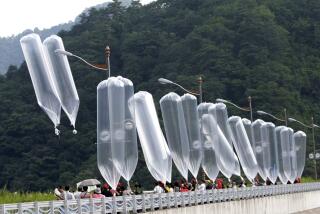Ex-S. Korea President Arrested in â79 Mutiny : Asia: Chun Doo Hwan is led from home in pre-dawn raid. Two of nationâs former leaders are now in jail.
SEOUL â In a pre-dawn raid on his countryside home, police arrested former South Korean President Chun Doo Hwan today in connection with a 1979 military mutiny that led within months to a coup and a bloody crackdown on the opposition.
Grim and silent, the former general was escorted by law enforcement agents from his home in Hapchon, 145 miles south of Seoul, into the glare of television lights. Relatives of victims of an infamous 1980 massacre screamed out: âExecute Chun Doo Hwan!â
Formally dressed in a suit, tie and dark overcoat, Chun, 64, turned once and waved goodby to relatives and supporters standing at the door, then got into a car and was driven away to face imprisonment in Seoul.
The arrest marks another dramatic turn in the political upheaval shaking South Korea, which began with a late October confession by former President Roh Tae Woo that he had accumulated a $653-million slush fund while in office. Roh, who was Chunâs successor, has been in jail since Nov. 16.
The court-issued arrest warrant for Chun called him a âringleader of arms seizure and insurrection.â It accused him and his co-plotters in the 1979 mutiny of murdering soldiers, and it cited a risk he might try to flee or destroy evidence if not immediately detained.
The warrant lists six insurrection charges against Chun that under the nationâs military code are punishable by death.
With two former presidents now in jail, the next legal steps may come against the nationâs top business leaders.
Rohâs arrest warrant accused him of taking bribes of more than $300 million from top tycoons during his 1988-93 term as president. Prosecutors said Saturday that Roh will be formally indicted on those charges Monday. They have indicated that as many as 20 or more top business leaders may also be indicted Monday but that at most only a few would face arrest.
Chun staged a military revolt Dec. 12, 1979, ordering the arrest of his commander, the army chief of staff. Roh, also a former general, was one of Chunâs key backers in the mutiny.
Five months later, when martial law was declared nationwide and opposition leader Kim Dae Jung was arrested, students and other residents in the city of Kwangju rose in defiance and seized control of the city. The response was a brutal military crackdown that left at least 200 dead.
Chun formally assumed the presidency later that year, ruling South Korea with an iron hand until 1988.
In July, prosecutors investigating these events initially decided not to indict Chun and Roh over the mutiny and massacre. But last month, under political pressure from the escalating scandal over Rohâs slush fund, President Kim Young Sam ordered the ruling party to prepare special legislation that would allow prosecution of the two former presidents.
Once that bill is approved, which is expected later this month, formal charges relating to the Kwangju massacre could be brought against Chun and Roh. Prosecutors questioned Roh at length Saturday on his role in the matter.
Chun had been ordered to present himself to prosecutors Saturday afternoon but instead issued a defiant statement accusing President Kim of launching a political vendetta. He then traveled by car to his hometown of Hapchon, where he was arrested today.
âPolitical developments may make me unable to visit home very often in the future, so I came for a visit,â Chun told a welcoming crowd of about 1,000 hometown supporters Saturday afternoon. Chun was shown on television prostrating himself to honor his ancestors at a hillside grave near his home.
Before dawn this morning, plainclothes riot police surrounded Chunâs home there, which had been staked out by hundreds of journalists. The police then pushed aside reporters to open a path for Chun and the arresting officers to pass from the house to a waiting car.
National television carried live footage of the police motorcade as it brought Chun on a four-hour drive to Seoul, where he was placed in a 130-square-foot solitary cell at Anyang prison in the capitalâs outskirts.
On Saturday, about 1,000 anti-Chun student protesters clashed with riot police at Seoulâs Yonsei University, throwing Molotov cocktails while police fired back with tear gas.
And in Chongmyo park in central Seoul, about 2,000 demonstrators also rallied Saturday to demand Chunâs immediate arrest and call for politically neutral prosecutors to handle the probe into the mutiny, coup and massacre.
An independent prosecutor is a key demand of the main opposition party, the National Congress for New Politics, a new party launched in September by Kim Dae Jung. The party, which charges that President Kim received money from Rohâs slush fund, has scheduled a massive rally for today to press the demand.
Some South Koreans expressed fear about where events may be leading. âWe are worried,â said Koo Chang Rim, a spokesman for the opposition United Liberal Democrats, âthat this may be the beginning of a new tragic incident.â
A Korean analyst, who spoke on condition of anonymity, said there appears to be no danger of an immediate coup dâetat against President Kim by military supporters of Chun and Roh. But if events in the months ahead spiral out of control, that could become a possibility, he said.
âThe more likely way a coup dâetat would happen is if society cannot be stabilized for a long time: if demonstrations are sweeping the streets, the ruling party has been split and the president proved to be taking great amounts of money from Roh, and [President Kimâs] mistakes in past years are revealed by former Presidents Roh and Chun,â he said.
More to Read
Sign up for Essential California
The most important California stories and recommendations in your inbox every morning.
You may occasionally receive promotional content from the Los Angeles Times.










